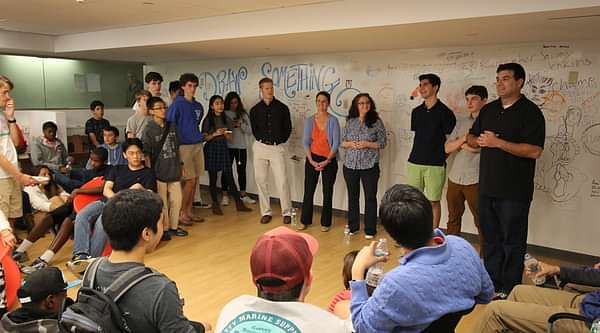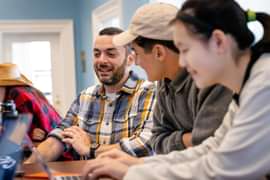
September 19, 2015
Collaboration in Focus
The Making of the OWHL Makerspaceby Jenny Barker
On Sept. 15, Michael Barker, Director of Academy Research, Information and Library Services, led a discussion about the creation of the OWHL Makerspace to a crowd of about 40 people in Pearson C, as part of the Tang Institute’s Lunch & Discussion Series. His talk focused on the library team’s progress in designing and developing a new Makerspace in the Oliver Wendell Holmes Library (OWHL), which is now open to the Andover community and features a 3-D printer, a sewing machine, and laser and vinyl cutters. The goal was to work with the community to create a lean, flexible, and informal space that brings together people of different backgrounds and skill sets to act upon their ideas together.
“Success for us would be this: a student has an idea, they go to the space and find peers and tools they need to cultivate that idea ..and then they share it with the world,” said Barker.
The space was built during the summer, with construction concluding in late September, thanks to the work of the Office of the Physical Plant (OPP). Planning began in April and involved a number of Andover faculty, students, and staff members, along with several external partners. Barker also drew inspiration from visits to other makerspaces in the area–including danger!awesome, owned and operated by a PA alumnus, and ones at MIT, Olin College, and local high schools–to consider a variety of approaches to hands-on learning. Together with colleagues, he connected with experts and practitioners of design thinking in order to collect feedback on the overall concept of the space and answer the question: what would be the right fit for PA?
Creativity for All
Barker envisions the space as being useful to classroom instruction—as a mode for connected learning that helps teachers to extend classroom learning into hands-on applications—and as being useful to student clubs, independent projects, workshops, and a variety of other planned and spontaneous collaborations. Student involvement—in both the ongoing development of the space and in idea generation for new projects—are key, he says.
“I can’t wait to see what people create in the space,” said Henry S Desai ‘17. “The Makerspace is one of the few places at this school which will allow any student to walk in with any idea and leave having created something … It is this openness—this lack of strict boundaries, lack of signs that would close the room to those not working on class assignments—that excites me most about the Makerspace.”

Celebrating the Space, its Possibilities
During a recent open house for the Makerspace—which drew more than 100 students and dozens of faculty and staff—Barker explained that the Makerspace is founded on the principles of design thinking.
“Innovation will happen here,” he said, “But even more important is how it gets done. Empathy is at the heart of design thinking and is also at the heart of our Makerspace–the notion that, in order to innovate well, you really need to talk to and understand the people for whom you’re creating that innovation. ”
The Tang team sees natural synergies between the Institute and the Makerspace and is excited to partner with Barker and the OWHL staff in supporting emerging ideas, connections to classrooms, and links between Makerspace efforts and Tang projects and between conversations and fellows. The hope is that the Makerspace provides a bridge to the Institute’s design as an ideas lab–bringing student ideas in conversation with faculty ideas and vice versa.
The Makerspace was founded with a donation from the Alexander family, who had approached Barker in 2014-15 with an offer to support a space inside the library. Read more about Barker’s lunch discussion in the recent Phillipian article and visit the library’s Makerspace page for up-to-date information.
The Makerspace in the OWHL at Andover is built upon the concept of design thinking. The following principles are core to Andover’s space:
Empathy: It is a space committed to the notion that innovation should be grounded in the understanding of others. In practice, this means to observe, to engage, and to watch and listen in order to understand the way people do things and why.
Ideas: It is a space that acknowledges our students and faculty are inherently creative.
Doing: It is dedicated to the “do something” mindset.
Other Stories

Andover classrooms are on the cusp of an AI-powered transformation.




